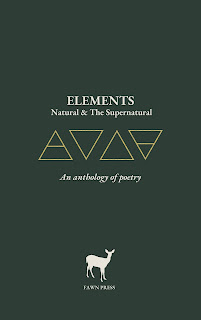About Elements: Natural & The Supernatural, ed. Scarlett Ward Bennett
Elements is an anthology of poetry inspired by the natural and supernatural elements of the universe and beyond. From the molecular chaos of running water and the impatient budding of leaves in Spring, to the whispering aether that fills the darkness of night, this anthology explores and celebrates the natural world, spiritual entities, and the forces at work all around us. It is the first title published by new publisher, Fawn Press, and is edited by Scarlett Ward Bennett with the help of Lexia Tomlinson and Konnie Colton.
About the editor
Scarlett Ward Bennett is a poet, workshop facilitator, editor and Director of Fawn Press. She founded Fawn Press in August 2021, with a vision of helping to bring beautiful poetry anthologies, pamphlets, and collections into the world. Her debut poetry collection Ache was released in 2019 with Verve Poetry press, and her work has featured in Under the Radar, Eyeflash Poetry, and Burning Eye. She is a workshop facilitator for Writing West Midlands and Homegrown 31, and visits schools around the country to deliver fun and engaging workshops to young people. She has worked as editor for On Your Doorstep Magazine and has worked as an editor for single-poet projects. She came runner up in 2019’s Verve Community competition, judged by Joelle Taylor, and the Wolverhampton Literature Festival Competition, judged by Roy McFarlane. Scarlett was nominated for a Sabotage Award for Best Spoken Word Artist in 2018, and in 2016, her poetry evening Cafe Del Nino was nominated for Best Spoken Word event.
About the publisher
New publisher Fawn Press aims to publish beautiful books of exceptional poetry, as we believe that poetry has the power to change lives through that transcendental connection between writer and reader. Storytelling lies at the very soul of our experience as human beings, connecting us since the dawn of time. We hope to be a platform that welcomes all writers, rejecting elitist and pompous attitudes to publishing in favour of an inclusive approach, whilst maintaining a high quality of exceptional writing that excites and inspires: “Poetry that takes you by the hand and leads you into the woods.” Fawn Press emerged from a passionate love of books and literature, as well as the recognition that the world needs more representation of new and under-represented poets. We are dedicated to the continual growth, education, and application of diversity.
Below, you can read two sample poems from our new anthology.
From Elements
and inhaling together, one giant in-suck.
gasping and clutching at your throat.
like them we must release ourselves towards air.
have softened in the garden a little, our wren
have taken to sitting out, fanning ourselves
There is an art to this – to breathing easy;
that the next breath will come,
on our filthy emissions, on sticky particulates,
Not unlike like that river fish, the pike,
his green slime-shimmer stalled among the weeds,
his habit, or if you like, his trick
and whole, and live.
thrashes a little, turns belly up and dies.
Ode to the Mirror Carp
Look! How they spin, fins vibrating and O-mouthed,
scales beating in a blood-rush.
It’s like a body rupturing, eating itself whole before re-entering the womb.
There’s a burning in their stomachs only death can cure.
Their hunger? Watch it rage, it’s the only thing that draws fish out of water.
they’ll stop squirming soon.
Mother reels them in.
I have her hands – I know, mine are just as impossible to hold.
I open and close my mouth, and swim, and swim.





